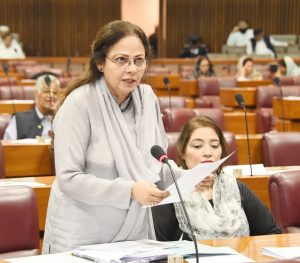IMF criticized as Pasha argues that “meddling in internal matters, not its mandate.”
Despite this, they are still hoping to strike an agreement with a worldwide money lender before presenting the new budget, so “Plan B” is constantly on the table.

ISLAMABAD — Pakistan’s Minister of State for Finance, Dr. Aisha Ghaus Pasha, has criticized the International Monetary Fund (IMF) for what she calls “meddling in internal affairs” after the IMF issued a statement outlining the conditions necessary to release the country’s postponed rescue package.
Earlier this week, PM Shehbaz Sharif contacted MD Kristalina Georgieva of the IMF in an apparent last-ditch effort to avoid default by reviving the derailed $6.5 billion bailout package. The IMF had previously urged Pakistan to follow the Constitution in order to resolve its political disputes.
After four months of failed loan negotiations, the finance ministry finally met with Georgieva on Saturday, according to government sources quoted by The Express Tribune.
IMF Mission Chief to Pakistan Nathan Porter made a surprising comment two days after the highest level of interaction was established between Shehbaz and Georgieva, shifting the IMF’s attention to the political sphere.
While we do not comment on domestic politics, we are aware of the recent political developments and share the hope that a peaceful resolution can be reached in accordance with the Constitution and the rule of law.
The announcement followed a crackdown on PTI workers, reports of abductions, the failure to hold elections in the two provinces within the constitutionally mandated 90 days, and the trial of civilians in military courts using the Army Act. The IMF typically refrains from making statements on political issues.
Porter detailed the requirements that Pakistan must achieve in order to negotiate an agreement with the foreign lender in response to inquiries from The Express Tribune. Among these include securing external financing, passing a new budget in line with IMF guidelines, and repairing the foreign exchange market.
The prime minister reportedly chose to intervene because he saw the IMF as the only way to prevent a default. The premier told the finance minister to give the IMF information on the upcoming budget after he met with the head of the IMF.
However, in a press conference today, Pakistan’s minister of state for finance assured reporters that if the deal with the IMF fell through, Pakistan would have other choices.
If an agreement cannot be made with the IMF, Pasha assured, “the finance ministry is not unprepared; a Plan B is always in place, but our preference would be to go with the IMF programme.”
She emphasised that, contrary to the extraordinary assertion made by the head of the IMF’s mission to Pakistan, “Pakistan is running in accordance with the law.”
And, “intervening in Pakistan’s internal affairs is not the IMF’s mandate,” she added.
The minister indicated unequivocally that delaying the programme’s resume would be detrimental to the interests of both parties, pointing out that PM Shehbaz has already assured MD Georgieva of Pakistan’s dedication to fulfilling the criteria necessary to finish the programme.
Pasha expressed optimism that a deal could be reached before the new budget was unveiled and that the IMF programme might be wrapped up by June 30.
She also mentioned that the “election-year budget” for the new fiscal year is now being drafted with June 9 as its starting point.
The minister added that the IMF does indeed permit Pakistan to get targeted assistance.









































